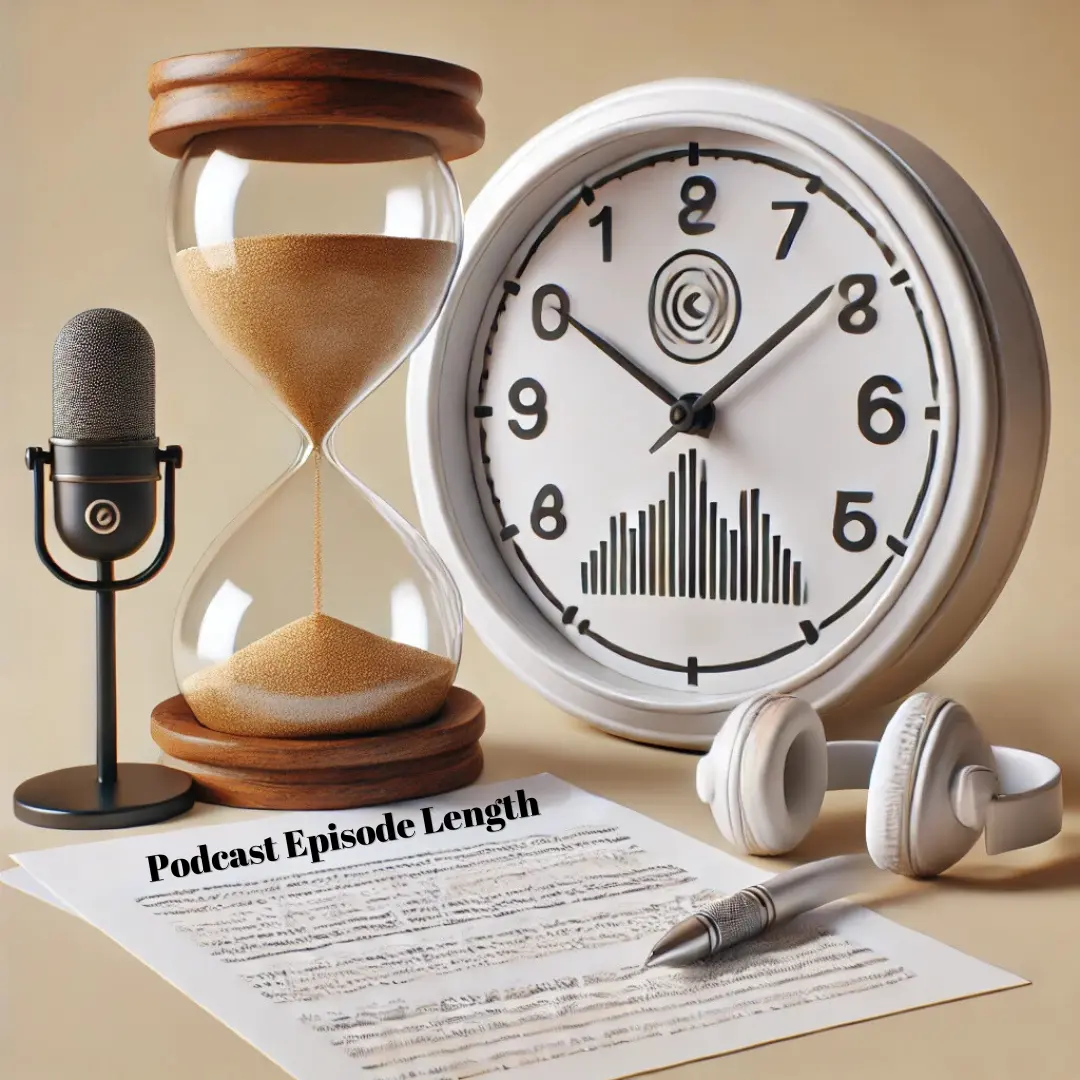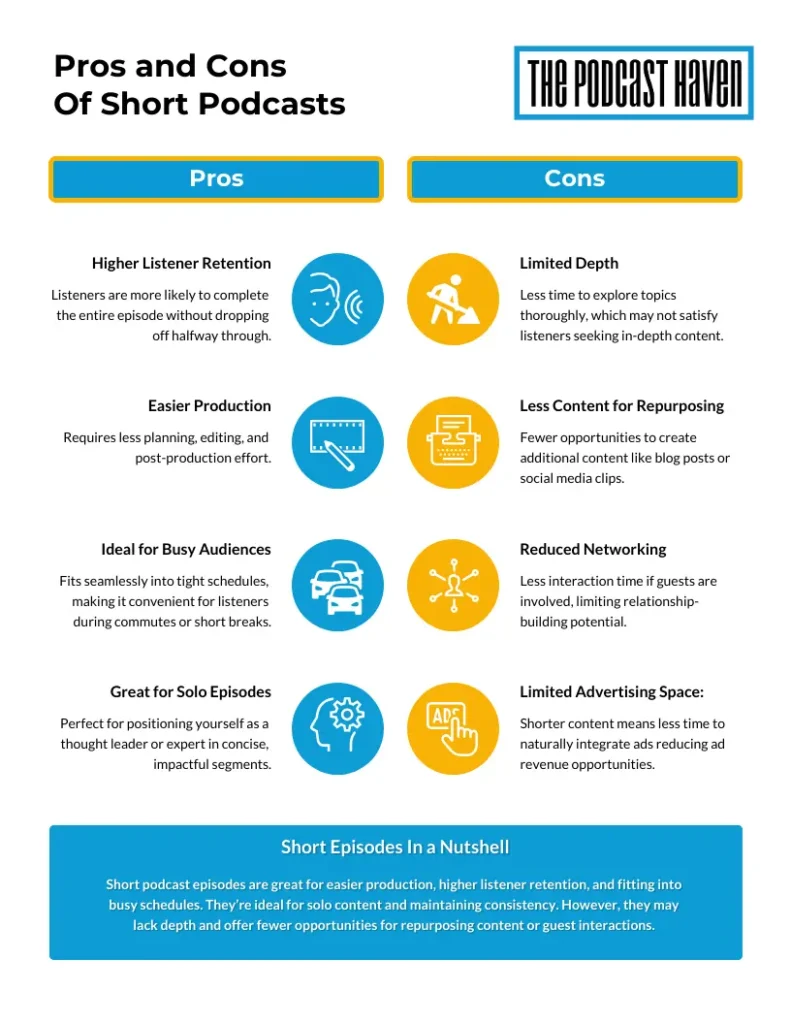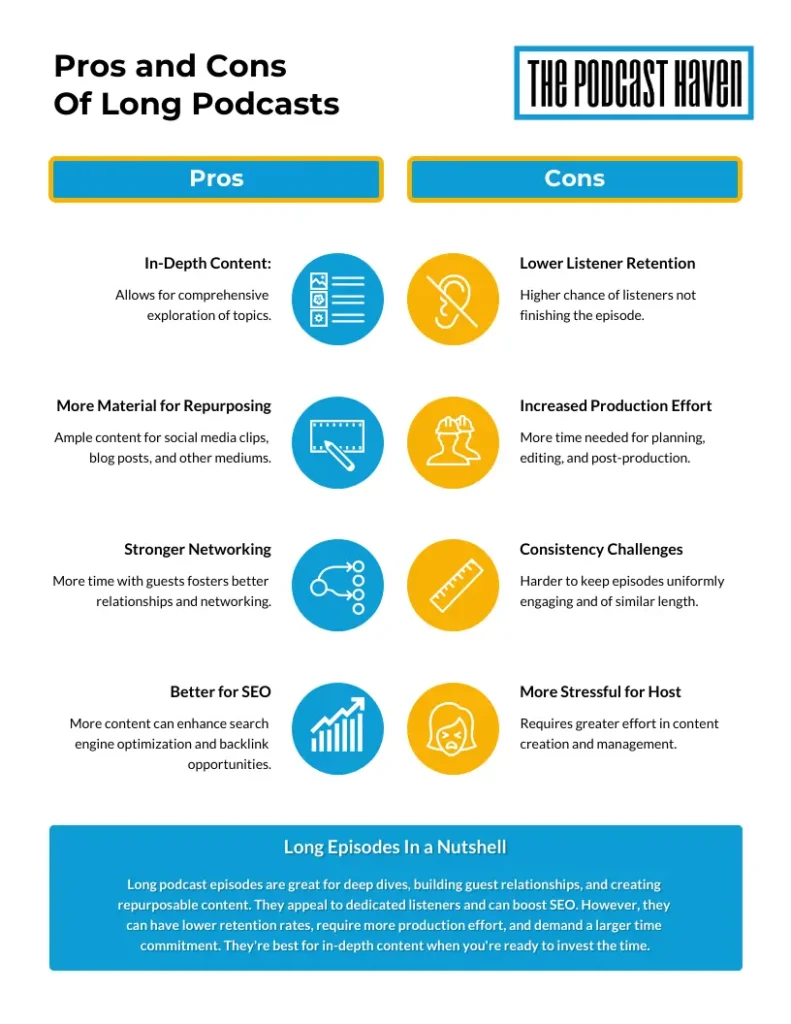
Determining your podcast length is a crucial step that can significantly impact your show’s success.
But here’s the good news: there’s no one-size-fits-all answer. The “perfect” episode length depends on various factors, including your content, format, and audience preferences.
Ever found yourself dozing off during a video, talk show, or lecture?
Hand raised!
According to a survey by LG Electronics USA, over 61% of people fall asleep while watching TV, and about 67.5% are multitasking and only half-listening.
Now imagine if that audience, knowing you are posting consistently, was tuning into your podcast instead.
We’ve all nodded off while trying to pay attention, usually because the topic is boring or the message drags on.
You definitely want to avoid this with your podcast.
Ask yourself, “How much material do I want to include in an episode?” It depends on your format and niche. Instructional videos differ from interviews or roundtables.
Know your format, then plan your podcast length accordingly.
Consistency is important—not as rigid as your scheduling, but your audience should know if they can finish an episode during their commute or if they’ll need to pause and resume later.
No one wants a 30-minute episode turning into an epic saga.
Zzzzz guaranteed!
Keep your audience engaged for as long as your good material lasts.
If you have an abundance of content on one topic and your show is typically 30 minutes, here’s a tip: find a good stopping point and create a “to be continued” episode.
If your content is engaging, you’ve just guaranteed listeners for your next episode.
In any case, let’s dive into the nuances of podcast lengths and explore how to find the sweet spot that works best for you.
Technically There’s No Right Or Wrong Length
First and foremost, understand that there’s no definitive right or wrong when it comes to podcast length.
Whether your episodes are 15 minutes or two hours long, what’s most important is that they provide value to your listeners.
However, different lengths come with their own sets of advantages and challenges.

Short Episodes Are Quick and Impactful
Short episodes, typically under 20 minutes, tend to see higher completion rates. Listeners are more likely to consume the entire episode without dropping off halfway through.
This increased consumption is not just good for your audience engagement but also plays a role in podcast rankings.
Apple Podcasts consider average listen-through rates when ranking shows, so higher completion can boost your visibility.
Short Podcasts = Easier Production
Shorter episodes generally require less planning, editing, and post-production work.
This makes them ideal for solo episodes where you position yourself as a thought leader or expert in your field.
You can focus on delivering concise, impactful content without the stress that comes with longer recordings.
Short Podcasts Are Ideal For Busy Audiences
In today’s fast-paced world, many listeners appreciate content they can consume during a short commute or while running errands.
Short episodes fit seamlessly into their schedules, making it more likely they’ll become regular listeners.

Long Podcasts: Comprehensive and Rich Content
Long-form episodes, ranging from 40 minutes + allow for deeper exploration of topics.
They’re particularly well-suited for interviews and discussions where you want to delve into the nuances and complexities of a subject.
As a host, you get the opportunity to build meaningful relationships with your guests, leading to great networking and richer content.
Long Podcasts Give You More Content To Repurpose
Long episodes provide ample material for repurposing.
You can extract “magic moments,” quotes, and highlights to create engaging clips for social media.
Additionally, the wealth of content makes it easier to repurpose episodes into blog posts, which can enhance your SEO efforts and generate valuable backlinks to your website.
Long Form Is Great For Building a Dedicated Audience
While longer episodes might deter casual listeners, they can be a goldmine for your dedicated audience.
These listeners are invested in your content and are more willing to spend the time necessary to consume lengthy episodes.
Long Episodes Mean More Production Time
It’s important to note that long-form episodes require more planning, editing, and post-production work.
This can add stress and consume more of your resources.
You’ll need to ensure that every minute offers value to keep your listeners engaged throughout the entire episode.
How To Balance Length and Content
Here are some guidelines to help you decide:
Consistency is your friend. Try to keep your episodes within a similar length range. This sets listener expectations and helps them plan their time accordingly.
Match the length of episodes to the intricacy of the content. Let the depth of your content dictate the length. If you have a topic that requires extensive discussion, don’t be afraid to go longer.
Conversely, if you can deliver value succinctly, a shorter episode might be more appropriate.
Always Consider Your Audiences habits. Think about your listeners’ habits and lifestyle.
Are they more likely to appreciate quick insights or do they prefer comprehensive explorations?
My Personal Philosophy on Podcast Length
In my experience, short-form episodes are fantastic for solo shows where you share your expertise.
Keeping these episodes under 15 minutes allows you to provide valuable insights without overwhelming your audience.
For interviews and more in-depth discussions, I find that a 40-minute episode hits the sweet spot.
It’s long enough to delve deep but short enough to maintain listener engagement.
This balance feels right to me and aligns with the feedback I’ve received from my audience.
Podcast Length Final Thought
Do whatever the hell you want. At the end of the day, create what feels right in the moment. Could be long, could be short, could be in between. Start listening to your intuition and create what you want to create.
Those end up being the best podcasts anyway because instead of following someone else’s framework, you follow your own and it makes your content truly special.
You think Jeff Bezos followed some framework he found online or in a book? You think he did what people told him to do?
LOL
Keep Listening, Keep Engaging, Keep Creating
Connect With Us:
- The Podcast Haven Homepage
- Our YouTube
- TikTok
- Listen To Our Flagship Podcast CLIPPED on Apple Podcasts
- Listen To Our Flagship Podcast CLIPPED on Spotify
